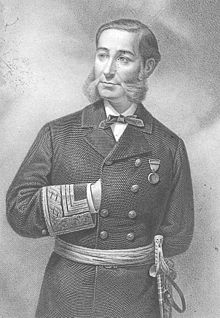Casto Méndez Núñez
 From Wikipedia the free encyclopedia
From Wikipedia the free encyclopedia

Casto Secundino María Méndez Núñez (July 1, 1824 – August 21, 1869) was a Spanish naval officer. In late 1865, during the Chincha Islands War between Spain, Peru and Chile, he became general commander of the Spanish fleet in the Pacific. He took that post after the suicide of Admiral José Manuel Pareja on November 26, 1865, two days after the naval Battle of Papudo. [1]: 17 As general commander, he received a promotion from Commodore to Rear Admiral.
In February 1866, Méndez Núñez sent two of his most powerful ships, the frigates Villa de Madrid and Reina Blanca, south to destroy the combined Chilean-Peruvian fleet. The resulting Battle of Abtao ended indecisively.
After the Chilean government ordered all vessels communicating with the Spanish fleet to be barred from Chilean ports, Mendez Núñez presented an ultimatum from the Spanish government, on March 24: if Chile did not meet Spanish demands, he would bombard Valparaíso, an undefended town and the port.[2]
Chile not having met the Spanish demands, on March 31 the Spanish fleet shelled and burned Valparaíso, on destroying Chile's merchant fleet.[3]
When Hugh Judson Kilpatrick, the American Minister to Chile, learned that Méndez Núñez had been ordered to bombard the port of Valparaíso, he asked the American naval commander Commodore John Rodgers to attack the Spanish fleet. Méndez Núñez famously responded with "I will be forced to sink [the US ships], because even if I have one ship left I will proceed with the bombardment. Spain, the Queen and I prefer honor without ships than ships without honor (España prefiere honra sin barcos a barcos sin honra.)"
On May 2, Méndez Núñez's fleet fought at the Battle of Callao, during which he was injured nine times. This was the final battle in the war between Spanish and Peruvian forces. On May 9, Méndez Núñez and his fleet departed for Spain.[2]
Honors[edit]
Four Spanish Navy warships were named Méndez Núñez:
- An armoured frigate, converted from screw frigate Resolución, renamed in 1870, retired in 1896
- A Blas de Lezo-class cruiser built in 1924, retired in 1963
- The former USS O'Hare (DD-889), a Gearing-class destroyer, in service for Spain from 1978 to 1992
- Méndez Núñez, an Álvaro de Bazán-class frigate commissioned in 2006
The municipality of Mendez, Cavite, Philippines, was also named in honor of Méndez Núñez.
References[edit]
- ^ Farcau, Bruce W. (2000). The Ten Cents War: Chile, Peru, and Bolivia in the War of the Pacific, 1879 - 1884 (1. publ ed.). Westport, Conn. London: Praeger. ISBN 978-0-275-96925-7.
- ^ a b Scheina, Robert (2003). Latin America's Wars: The Age of the Caudillo, 1791-1899. Brassey's. ISBN 9781597974776.
- ^ "Bombardment of Valparaiso.; Official Report by Admiral Casto [sic] Memdez [sic] Nunez. Curous Statement Regarding the Course of Gen. Kilpatrick and Commdore Rogers". New York Times. May 10, 1866. p. 2. Retrieved February 7, 2024.